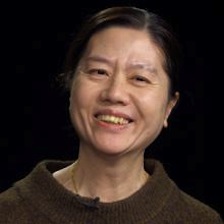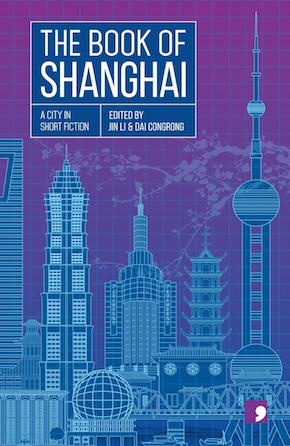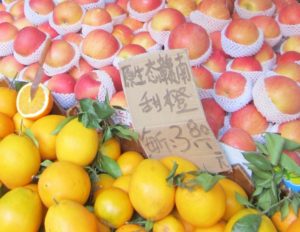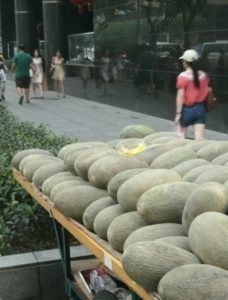Ah Fang’s lamp
by Wang AnyiPeople often have grey days, just as there are sometimes grey skies.
I walked down that wet little side street, and every single door was shut. Raindrops rapped on the concrete road, rat-a-tat-tat, spattering echoes in the empty street. Gazing at the leaden cloud, the monotonous sound of rain all around, an indescribable gloom welled in my heart.
Yet on sunny days, this little street is bright and breezy. The doors of the houses are half-open, old people sit outside preparing vegetables as little children play beside them. Behind the quiet old people and the lively little ones are their family homes. What kind of lives go on in these homes that open on to the street? When I have time to spare, and nothing else on my mind, I start to wonder.
On one particular day, a very ordinary day – not grey, but not one of those cloudless days either – I was walking along and, by a chance turn of the head, caught a glimpse through an open door. Although it was way past lunchtime, the table hadn’t been cleared, and a big man lay sprawled over a bamboo couch, so dead to the world that the fly on his cheek looked completely at ease. An old woman, apparently his mother, had her back to the door, and was working the treadle of a heavy sewing machine, the crude sound of which drowned out his snoring. Everything inside was unutterably decrepit, and when I caught a whiff of decay, I stopped looking and walked on. The evening sun dazzled on the wutong leaves, and I walked on through leaf-mottled shadows.
Time passed, and I found myself walking up and down this street several times a day. I had moved house, and it turned out that the street was on my way to work. After walking this way for I don’t know how long, I began to notice a tiny fruit stall set out beneath a window. The window- and door-frames had a fresh coat of red-brown paint, and there was a big green fibreglass canopy over the window. Beside the stall sat a girl with Japanese style hair, her thick fringe masking lively eyes. Her face was beautifully delicate, if a little too pale, but her lips were naturally red and full. She wore a red jacket, and like a red cloud that had settled beside the yellow pears, green apples and black water chestnuts, she would sit there quietly reading a small illustrated book or knitting a jumper that was not just red. When someone walked past, her eyes would peer up through the black hair on her forehead, and as soon as the person slowed their step, she would be on her feet, waiting quietly but keenly. The waiting paid off; people rarely disappointed.
Her knobbly joints and dry palms spoke silently of a hard life. And yet her face was so young, her soft, smooth cheeks so white and translucent, her eyes so bright.”
On one occasion, I stopped in front of her fruit stall and she called me over: ‘Come and buy something!’ Her voice was coarse and gravelly, completely at odds with her delicate appearance. I was there for a while, and, assuming I was trying to make up my mind, she said, ‘The Hami melons are very good, they just arrived at Shiliupu Wharf yesterday. They’re a little pricey, but they’re worth it.’
I didn’t buy a melon, but after I’d selected a few apples and she held up the scales, I noticed her hands. Her knobbly joints and dry palms spoke silently of a hard life. And yet her face was so young, her soft, smooth cheeks so white and translucent, her eyes so bright. She weighed the apples, then worked out the price on a tiny calculator, her thick finger tapping on keys the size of rice grains, rounded it down, and helped me put the apples in my bag.
After dark, business would be brisker, and a man came to help her. I heard him call her Ah Fang. I guessed he was her husband, though I felt she was far too young to have one. Then one day, I noticed there was something different about Ah Fang. It took me a few walks up and down the street to work it out. When I realised that her waist had thickened, and it was clear that she was pregnant, a strange feeling welled up inside me; I felt sorry for her, but also moved. And when I looked at the two of them again, I couldn’t deny they looked good together. He was a big strong man, she was a beautiful slim woman, and they were both young. You couldn’t not feel happy for them. He wasn’t as quick with his hands as Ah Fang, and he wasn’t as sharp as her either, but he was just as attentive to the customers. One evening, he tried to get me to buy some bananas that were past their best, and followed me down the street for a while in the light rain, saying over and over again:
‘You can pay later if you don’t have the cash on you now.’
Another time, when I was buying lychees, Ah Fang started a conversation:
‘I always see you walking up and down. You must live on this street. Which number are you?’
I told her that I didn’t live on that street, and that I had to walk this way every day to work.
‘I thought that might be the case’ she said, helping me with the lychees. I noticed a dark patch on her face, and a dullness about her lips. But she’d painted her nails with bright red polish. Although they were at odds with her thick finger joints, and inevitably tacky, there was an innocence to them, and I didn’t find them at all repulsive. In return, I asked her a question:
‘Who brings the fruit here? You surely don’t do it all by yourself?’
‘My husband does it. He goes to Shiliupu after work, or sometimes first thing in the morning.’
‘And the licence is in your name?’
‘Yes, although technically I’m unemployed!’ The brown mark on her face seemed to redden as she answered, so I didn’t ask any more.
It seemed that Ah Fang and her fruit stall had brought new life to this street, even on days when dark clouds filled the sky.
Late one night, when it was raining lightly, I walked this way and found the entire street was quiet, with all the doors closed. In the distance, I saw an electric lamp hanging in front of Ah Fang’s door, shining down on her belly as she sat in her chair, head lowered, knitting a sweater. I didn’t want to startle her, and continued to walk on the other side of the street. As I walked slowly past, her exquisite profile across the wet street moved across my line of vision.
After that, the fruit stall was packed away, presumably around the time Ah Fang gave birth. The street became unusually quiet and cold. Not just on overcast days, but on bright sunny days too. Ah Fang’s door was closed. The closing of the door, like a drop of water running into the sea, returned the house to the long row of doors that all looked the same. I couldn’t even remember which was Ah Fang’s door, and made a mental note, next time the door was open, to record the house number above the door lintel. But, in such a vast world, what does a little character like Ah Fang count for? After I’d walked past a few more times, this young woman faded from my thoughts, and I got used to this watery street not having a fruit stall. It was just a street I walked through, my life being something that happened at either end. And as far as the street was concerned, I was just a passerby, the different lives inside those different doors were none of my business.
It was as though I had received a message and set me wondering about Ah Fang. She must be a mother by now, I thought. Did she have a boy or a girl?”
I continued to walk through that street every day, knowing the square concrete blocks that made up the road like the back of my hand. Green bamboo poles poked out of open windows that looked on to the street, bearing washing hung out to dry; ice-cold drops of water collecting in the corners of these clothes seemed to fall on my forehead with a cheeky familiarity. Sometimes, there’d be rainbow soap bubbles floating in the air. I’d catch one in the palm of my hand, and it would stay for a while, like a dream shining back at me. A child’s dream, I thought, and then it would burst without a sound, leaving the slipperiness of water in my palm. Then a new one, even prettier, would float down towards me. From winter to summer, autumn to spring, there were grey days, and bright days, and I came to be so familiar with the street I didn’t notice it any more. Although there was that one time, when a dark red rose branch torn from its bush suddenly fell from one of the roofs on to my shoulder, then landed at my feet. It was a very clear early morning just after a Category-10 typhoon. It was as though I had received a message and set me wondering about Ah Fang. She must be a mother by now, I thought. Did she have a boy or a girl? She probably wouldn’t be opening the fruit stall anymore!
But Ah Fang did set out her fruit stall again. One evening, no different from all the other evenings before it, I suddenly noticed her. With the same fringe over her eyes, which were as bright as ever, and still wearing a red jacket, her skin just as white and translucent as before, she was quietly running a fruit stall ablaze with purples and reds. Only now she had a fat white baby in her arms, with lips as red as her own. The slender Ah Fang with a fat white baby in her arms looked adorable. She apparently didn’t recognise me when she called out attentively:
‘Come, take your pick?’
When I’d selected a bunch of bananas, she put the child in a stroller in front of the door, and weighed the bananas. I noticed a new thick band of gold on her ring finger, which had a rich, dark gleam to it.
The street had a fruit stall again. Ah Fang was back, with her husband and baby. Ah Fang finally recognised me, or at least said she remembered me. Whenever I passed by she would greet me and encourage me to buy something, or ask if yesterday’s melon had been sweet or not. I was welcome to buy on credit, she would tell me, though I never did.
The little boy started to grow, gradually, almost imperceptibly; and Ah Fang, also gradually and imperceptibly, started to put on weight, though she was still slim and beautiful. Another heavy gold necklace appeared around her neck, and she wore a delicate little bracelet on her wrist. In the evenings, under the electric lamp they brought outside, Ah Fang knitted sweaters, her husband read books, and her toddler learned to walk in a baby walker. The fruit on the stall changed with the seasons, and there would often be some more exotic, and more expensive, fruits, such as mangoes, sitting regally among the crowd of ordinary fruit.
This picture of simplicity and harmony often touched me, offering a sense of the power of life in its most ideal form, a glimpse into the secret of life and of living. On those miserable drizzly days, those frustrating and anxious days, the sight of Ah Fang, even the dull glow of the lamp by her door, was enough to lift my spirits.
One night, there was an almighty downpour that saw rain bouncing off the ground. With almost no one out on the street, bicycles flew past in the blink of an eye. As I passed Ah Fang’s door, there was an emptiness around it, although the door itself was open and a light on inside. All of a sudden, I heard someone call me; in the clatter of rain, it seemed far away. But when I looked round, I saw Ah Fang’s husband, standing in the doorway. They had the most delicious muskmelon that day, he said; he’d give a refund if it wasn’t sweet; or I could take it, eat it, and pay later, and so on and so on. I smiled at him, collapsed my umbrella and went in. The toddler was asleep, his head sticking out from beneath a pink blanket, his fingers in his mouth. Ah Fang was watching TV, a live Yueju opera contest, on a 20-inch colour TV. Inside there was a refrigerator, a twin-tub washing machine, a ceiling fan, a cassette recorder, and so on. I chose a muskmelon from the basket, and after I’d paid for it, Ah Fang’s husband invited me to sit for a while, until the rain stopped.
The rain was torrential. Bucketing it down, as they say. I didn’t go, but I didn’t sit either, continuing to stand there chatting with him.
‘Are there just the three of you living here?’ I asked.
Yes, he said, his mother had died last year, adding that she used to sleep upstairs.
I hadn’t noticed there was an upstairs, but halfway down the room was a sliding wooden door, carefully painted a cream colour, which was closed.
‘And your fruit business is doing well?’ I asked.
I suddenly remembered, all those years ago, walking around here, that messy, bleak scene through the door. There was a son and a mother. Perhaps it was this place, right here, it must have been here. My mind started spinning.”
‘It’s unpredictable,’ he said. ‘Take last summer’s watermelons, we had so many of them, then it turned cold and the price dropped just like that, and we lost hundreds, you know! But the state-run stores lost even more,’ he laughed, taking comfort in the thought. I found that, despite his stocky build, there was a bookish air about him, as though he’d had an education. I asked him what he did, and he said he was just a lathe operator, that he’d taken over his mother’s job at the factory when he came back from the countryside.
A thought flashed through my mind, as I suddenly remembered, all those years ago, walking around here, that messy, bleak scene through the door. There was a son and a mother. Perhaps it was this place, right here, it must have been here. My mind started spinning. Ah Fang was singing along with a contestant – ‘Baoyu’s Tears of Grief ’ – and was too absorbed to care about a stranger in the midst. I looked at her, and wondered if she had pulled that bleak home back from the brink? If she had turned the jaded lives of a mother and son around, and restored their honour?
But I didn’t know for sure if that was this place. All the doors here look the same, and when they’re shut, you can’t tell whose is whose. I desperately wanted confirmation, but feared it at the same time. I was afraid that my speculation would be unfounded, like a dream being shattered. I wanted it to be that home, I wanted it with all my heart. So I decided to leave straight away. The rain was pelting down, even heavier than before. Ah Fang’s husband did his best to make me stay, and even Ah Fang herself looked round and said, ‘Stay a while.’
But I still left.
I ran from Ah Fang’s home as though I was running away. Ah Fang’s lamp in the doorway cast a dim light a good length of the way. I didn’t look back. I was afraid I’d be unable to resist asking for, and getting, confirmation, and it was so unnecessary and stupid. I didn’t want to spoil this beautiful story, I wanted it to live on, with me.
And that was how I wove my own beautiful fairy tale, which, on grey or rainy days, inspires me not to be disheartened. And I have written this story down, word by word, sentence by sentence, in the wish that it will become a little tale told of this little street, for Ah Fang’s toddler when he grows up, and forever in the future.
Translated by Helen Wang, from The Book of Shanghai (Comma Press, £9.99)
The Book of Shanghai, edited by Dai Congrong and Dr Jin Li, collects stories by ten leading Chinese writers, peopled with characters whose individuality reminds us why Shanghai – a city of hurtling economic growth – remains an epicentre for creativity.
Read more
 Wang Anyi was born in Nanjing in 1954, moving to Shanghai the following year. She is among the most widely read authors of the post-Mao era and one of China’s most influential and innovative writers. Her most famous work is The Song of Everlasting Sorrow, which has been adapted for screen, television and stage. She has won numerous awards including the Mao Dun Literature Award in 2000, and her novel Baotown, translated by Martha Avery, has been nominated for the Los Angeles Times’ Book of the Year and the 2011 Man Booker International Prize. She is currently chair of the Writers’ Association of Shanghai, and professor of Chinese literature and creative writing at Fudan University. Her novel Fu Ping, translated by Howard Goldblatt, was published in August 2019 by Columbia University Press.
Wang Anyi was born in Nanjing in 1954, moving to Shanghai the following year. She is among the most widely read authors of the post-Mao era and one of China’s most influential and innovative writers. Her most famous work is The Song of Everlasting Sorrow, which has been adapted for screen, television and stage. She has won numerous awards including the Mao Dun Literature Award in 2000, and her novel Baotown, translated by Martha Avery, has been nominated for the Los Angeles Times’ Book of the Year and the 2011 Man Booker International Prize. She is currently chair of the Writers’ Association of Shanghai, and professor of Chinese literature and creative writing at Fudan University. Her novel Fu Ping, translated by Howard Goldblatt, was published in August 2019 by Columbia University Press.
cup.columbia.edu
Helen Wang is a curator at the British Museum, and an award-winning translator both in the UK (Marsh Award 2017) and China (Chen Bochui Award 2017). She works with Paper Republic, the Leeds Centre for New Chinese Writing and Chinese Books for Young Readers.
@HelenWangLondon
Comma Press is a not-for-profit publisher based in Manchester specialising in the short story and fiction in translation, and the North England regional winner of the 2020 British Book Awards Small Press of the Year.
@commapress




